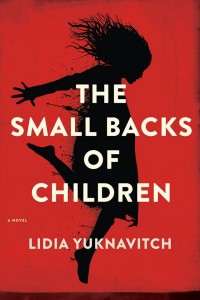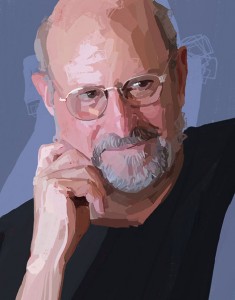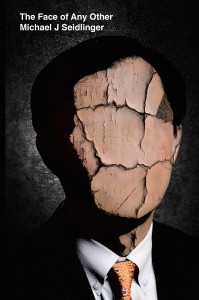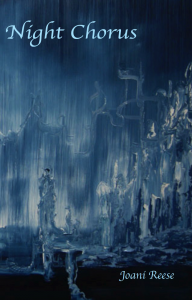 We are pleased to welcome Lidia Yuknavich to Fictionaut’s Writers on Craft. Lidia Yuknavich is the author of the forthcoming novel The Backs of Small Children, the novel Dora: A Headcase (Hawthorne Books), and the memoir The Chronology of Water (Hawthorne Books), as well as three books of short fictions-Her Other Mouths, Liberty’s Excess (FC2), and Real to Reel (FC2), and a critical book on war and narrative, Allegories of Violence (Routledge). Her writing has appeared in publications including Ms., The Iowa Review, Zyzzyva, Another Chicago Magazine, The Sun, Exquisite Corpse, TANK, and in the anthologies Life As We Show It (City Lights), Wreckage of Reason (Spuytin Duyvil), Forms at War (FC2), Feminaissance (Les Figues Press), and Representing Bisexualities (SUNY), as well as online at The Rumpus. She writes, teaches and lives in Portland, Oregon with the filmmaker Andy Mingo and their renaissance man son Miles. She is the recipient of the Oregon Book Award – Reader’s Choice, a PNBA award, and was a finalist for the 2012 Pen Center creative nonfiction award. She is a very good swimmer.
We are pleased to welcome Lidia Yuknavich to Fictionaut’s Writers on Craft. Lidia Yuknavich is the author of the forthcoming novel The Backs of Small Children, the novel Dora: A Headcase (Hawthorne Books), and the memoir The Chronology of Water (Hawthorne Books), as well as three books of short fictions-Her Other Mouths, Liberty’s Excess (FC2), and Real to Reel (FC2), and a critical book on war and narrative, Allegories of Violence (Routledge). Her writing has appeared in publications including Ms., The Iowa Review, Zyzzyva, Another Chicago Magazine, The Sun, Exquisite Corpse, TANK, and in the anthologies Life As We Show It (City Lights), Wreckage of Reason (Spuytin Duyvil), Forms at War (FC2), Feminaissance (Les Figues Press), and Representing Bisexualities (SUNY), as well as online at The Rumpus. She writes, teaches and lives in Portland, Oregon with the filmmaker Andy Mingo and their renaissance man son Miles. She is the recipient of the Oregon Book Award – Reader’s Choice, a PNBA award, and was a finalist for the 2012 Pen Center creative nonfiction award. She is a very good swimmer.
What do you read when you despair at the state of either your work or a particularly difficult manuscript in progress—any “go to” texts?
Well here’s a true story—ALL the manuscripts I work on are a wrestling match! Ha…then again, if they weren’t, I’d likely lose interest. But there really are books that I keep near to help me remember three things:
- o There is more than one way to render a story and there always has been
- o Women writers have a right to their own bodies, forms, and storytelling
- o Language carries its own physics. Particles and waves. Energy never dying, just changing forms.
So the writers who help me remember those three things include Marguerite Duras, Carole Maso, Virginia Woolf, Clarice Lispector, Toni Morrison, Joy Harjo, Maxine Hong Kingston, Anne Carson, H.D., Walt Whitman, Emily Dickinson, Samuel Beckett, Doris Lessing, Gertrude Stein, and Kathy Acker. All collected they are like a build-it-yourself New Testament devoted to formal play—to making meaning not only through content, but through form.
But I’d be lying if I didn’t also admit this: I’m a slutty reader. I also turn to Sci-Fi A LOT, Thrillers, True Crime, Historical Fiction, all kinds of Fantasy—those books have helped me out of creative jams too. They loosen the limits of my stubborn addiction to language and remind me to play.
Lastly: here’s a secret: when I’m stuck I go to paintings, not books.
If you could give just one piece of advice to emerging authors about editing that has served you well, what would it be?
Do you mean the process of revision? Editing one’s own work? Revision isn’t a drag for me at all—I love the idea that you can go in and change anything! At any moment! I don’t find much that’s precious in my own writing so I’m fairly willing to shape-shift any line or idea. And for me, deep revision is about reading my own work vertically—like a poem—and identifying patterns, figurative opportunities, hidden pockets where I can dive deeper.
I save line editing for the proofreading round.
My favorite kind of editing or revising happens in collaboration with someone else though. For example, the creative collaboration I had with Rhonda Hughes at Hawthorne Books when I wrote The Chronology of Water, or the one I just experienced with Calvert Morgan at Harper for The Small Backs of Children. Trust me when I say I am a lucky writer—both of these editors are brilliant co-conspirators who love literature as much as I do. So “editing” felt like pushing the creative process as far as it could go.
But again, when it is just you, alone with your writing, I’ve found a process that works for me that I am developing for others…it involves letting go of your critical : logical : grammar drunk mind and instead letting your subconscious drive the car for a bit. It involves hunting for latent or implicit material in your own work, seeing if there are any places where you can dig deeper, open up, seeing what words and images, themes, and metaphors recur and reworking with an eye toward a more authentic gestalt. Sometimes there is a whole book hiding within the one you think you “finished.”
I’m in the process of developing a workshop series and book on this methodology.
Looking forward to the book, for sure. How has your perception of what you “do” with your work changed as you have continued to write?
OH I like this question a good bit because it really does change. Radically.
Technically speaking, trauma brought me to the page…my daughter died the day she was born and I moved toward psychosis from grief. Then writing started to come out of my hands. At first it was gibberish. Then it wasn’t. Likely putting what I was feeling to the page kept me from death or insanity. I’m often surfacing the idea in my novels that the intensity of the imaginative realm is not unconnected to altered states of mind—even psychosis. I’ve been there so I know what I’m talking about.
In my twenties, which is when I started writing in a way toward entering the world, my creative drive was quite a bit about refusing to be quiet anymore, and about claiming a space within language and experience from which to speak. And I truly had an urge to bite and scratch. I suspect I was trying to get my body into representation. I had a rage driving me like you wouldn’t believe—but then, rage is something we don’t afford girls growing up, is it, and so I think now that my rage was a necessary developmental stage. Who among us can push up and through to an authentic life by skipping anger?
In my thirties, I met my own intellect for the first time. It was literally like meeting a second self, one I had no idea existed. At first I wanted to punch her in the face. I was threatened. I thought she wanted to kill my creativity or something. But what I learned in my thirties is that a woman’s intellect and her creativity could, if she let them, love each other. The writing I did in my thirties reflects that process…that struggle toward integrating different parts of a self.
The writing I did in my forties was driven almost entirely by a colossal desire to go back and get the pieces of self that I’d hidden or lost or injured along the way in my life. A sudden flash of realization that I was not whole, and that I could not go on missing an arm and a leg and half of my heart. But too, the decade of my forties is pretty much when my skill as a writer began to kick in. I’m a late bloomer I guess. And so the question became, what to do with a whole self and a bit of skill. And that is a radically different “place” to be as a writer than any of the other places I’ve been. I went straight to the body. This time in my life is where I discovered corporeal writing for myself. And it changed my writing forever.
On this side of fifty? What I am “doing” with my work is leaving the comfort of the personal and venturing into the territory of the world and what we’ve made of it. I’m interested in things like empathy and geopolitics and eco-novels and social justice. When I grow up I’d like to be Doris Lessing. I’m pretty sure I’ve got a leg up on the hair.
What do you feel is the purpose of literature?
To wake people the fuck up.
At least the literature I love the most does that. But we need all kinds of literature, everything there is on a living spectrum, alive, noisy, unflinching. It only takes a sentence to change someone’s life, and that sentence could come from anywhere.
Sometimes in writing classes you teach, you discuss a wonderful idea for writers that involves “writing one’s way in” to difficult topics through objects. Can you speak to this concept of writing one’s way in for a moment, share it here?
This is a poet’s wisdom—I am ever in debt to poets and painters and musicians and filmmakers. Images, objects, metaphors—they can carry part of the story for you if you let them. And they can get more of the story to come out of you as well, because bypassing the critical mind, the mind that overthinks and analyzes things, can sometimes yield what exposition cannot. Look what “water” or “rocks” did for me! Or read any poem by your favorite poet—because a poet can distill experience via language better than anyone else in the world. What I learned when I wrote about water until I could not write about water any longer is that my whole life can be rendered in stories about water. What I learned about rocks from refusing to stop writing about rocks is that I can meet the reader there, in the palm of their own hand, and I can invest that object in their hand with a truth that was mine, but is now ours.
As a human being, what is the best advice you have to offer?
I’m afraid I’m a failure at offering “human being advice.” Everything I know about becoming a better person has come from my son. The last thing he said that astonished me was yesterday (I often post his witticisms on my Facebook page as “Milesisms”). He busted out with: “We don’t need more fictional heroes. We need regular people to wake the fuck up.”
To me, that’s a profound statement.
He also said love is the fifth element, after we watched The Fifth Element, and that government can never fully contain art, after we watched and read V.
I get my wisdom from popular culture, literature, art, and 14 year olds.
 I love the visceral quality of your work. Both Dora and The Chronology of Water are fascinating with how vividly they approach and examine the individuals in their narratives, despite that one book is a novel and the other a memoir. What created your vision or pull toward the newest book, The Backs of Small Children? Can you speak to what compelled you toward writing this book in particular?
I love the visceral quality of your work. Both Dora and The Chronology of Water are fascinating with how vividly they approach and examine the individuals in their narratives, despite that one book is a novel and the other a memoir. What created your vision or pull toward the newest book, The Backs of Small Children? Can you speak to what compelled you toward writing this book in particular?
There is a quote from a Kathy Acker novel that, for better or worse, lodged itself in my heart forever: “War, if not the begetter of all things, certainly the hope of all begetting and pleasures. For the rich and especially for the poor. War, you mirror of our sexuality.”
When I first read the novel that carries that quote, Empire of the Senseless, I had no idea what it meant, but I was definitely gutted by the language. The book changed me forever. It made me look at psychosexual development and cultural inscription and capitalism in ways that haunted me the rest of my life. It made me look at the relationship between art, war, and sexuality different forever.
The Small Backs of Children is a book I began before I wrote a word of The Chronology of Water. But it was more abstract when it first started coming out of me, so it didn’t have a form yet. For a while there it was what my husband Andy Mingo called an abstract epic poem.
To be honest? I think I had to stop and write The Chronology of Water in order to finish figuring out what was fractured in me before I could return to The Small Backs of Children. I kept running into the same wall: OK, this emerging book is about art, war, sexuality and a girl child…what in the world do art and war have to do with the psychosexual development of children? Am I nuts?
What was fractured in me was something my beloved friend Vanessa Veselka nailed: How is it that I am alive when you are not? The wound I carried in my body—the death of my daughter—there was something inside of that wound besides grief, pain, loss. There was an entire world. A character. A story. About what art means to me. About the agency of girls—ALL of their agency, including their rage and desire and fire—and how we have yet to honor fully honor their bodies and lives and stories.
Ever since then, I’ve been writing books that loose new girl bodies and stories into the world.
Too, The Small Backs of Children is partially informed by events from my Lithuanian family history. This novel is also a kind of answer to the question I’ve been asked two trillion times: “What is the difference between fiction and nonfiction?” To which my answer remains: a slight membrane, thin as infant’s skin.
I love how dense and fine The Small Backs of Children is—and how many forms of writing dominate the pages, the formal play you discuss. It feels like a magical package rather than a book: a poetic narrative, a theatrical narrative, a fictive narrative, a correspondence, a shifting fever dream, and an independent film. All of these things. Sometimes all at once. It’s also intensely erotic and savage, in turns, so your above answer is very satisfying. It does feel epic.
As an aside, I think the formal authorial skills displayed by this text, the high and low topical and tonal variances in the narrative stream, allow for a lot of good liberty to bring complex sexual identities into a wider readership’s consideration. For example, I think readers of literary fiction who would not deliberately read erotic fiction outside of a hetero-normative standard will likely gain exposure to more than they bargained for when they crack this book—and yet there is enough of what the literary reader seeks that will satisfy him/her as well. Do you think this book is an artful embodiment of a sign of the times in terms of societal changes both to come and in progress now regarding how people see sex and love in comparison to what was formerly considered perversion—or instead a gauntlet tossed into the literary hetero-dominated landscape today in terms of encouraging a more open societal embrace of diverse sexualities? The power of the pen is mighty here.
LOVE this question. I have more than one answer (I’m a Gemini. What are you going to do?). My first answer is, it depends on where one locates “perversion.” I locate perversion at the site of war and damage it does to human bodies. And I focused in on the non-soldier body on purpose. It is profoundly perverse to me that we ignore the ways in which torture and mutilation of the bodies of women and children are prominent features of warfare. How many children in the world have survived this brutality? Where are their purple hearts? So that I surfaced explicitly sexual material alongside the story of a child surviving wartime abuse and damage of the most horrible kind, means I was unwilling to avert my eyes to what we mean when we say “perverse.” The private sexual practices of individuals—like fisting between women—that is not perverse to me. The ravaged bodies of women and children as a result of perpetual war. That’s perverse.
My second answer is, yes, I consciously set out to monkey-wrench the literary het dominated landscape in an effort to raise questions and diversify what we mean when we say sex, sexuality, sexual identification, and even love. There is more than one love story in the book. But it’s not the love story we’ve been trained to value and award. There are a variety of sexualities represented in the book. But they do not fit the categories we’ve been trained to accept in our literature. In particular I was interested in restoring both agency and exploration to the sexuality of women and girls. We are not the story our culture has made for us. We never were. I don’t know a single woman or girl (or boy or man or anyone in between) who fits the script culture hands to us with regard to how to live and love and experience desire. So I’m bracing for the “these women are unlikeable” response, or “this sexuality is excessive” response, because I quite consciously wrote those questions alive in the bodies of the women characters. I did it on purpose. I’m not sorry.
It wouldn’t be untrue to say that the women characters in the book are all versions of one woman’s sexual diversity played out across the plane of narrative form.
My third answer (don’t panic I don’t have a hundred answers ha) is, I don’t think there is anything “new” about what I’ve done with the sexualized material in this novel. Certainly my influences were way ahead of me—Anais Nin and Kathy Acker and Marguerite Duras and Clarice Lispector. But I have noticed that sexualized language in literature sort of comes and goes in waves. And sometimes what passes for representations of sexuality in literature makes me laugh. If a woman writer conforms to representing sexuality in prescribed forms and traditions that qualify as entertaining, green light. But if a woman writer, breaks those codes, risks representing sexuality in every part of her life, in its raw and messy and chaotic forms, if a woman writer, for instance, dares to articulate desire as a perpetual force in her life, away from the heterosexual love plot or chase plot or male savior plot, it’s “deviant.” And I think the same thing is true for LGBT writers and writers of color. Which is complete bullshit. I hope in my lifetime we see thousands more representations of sexuality. We don’t need less, we need more. This is my call to arms.
As to the multiplicity of literary forms you mention at the top of your question, I think we have come to a moment in our evolution as people and makers of art in which the traditional notion of mimesis has been flipped over. Whereas it MAY have been true that art mirrored life experiences in the past, you know what? I’m starting to think we have come to a time where we’re starting to live our lives based on the representations around us. I think we are acting our relationships in the terms of drama, film, television, narrative form. In other words, I think we live by the codes of our dominant representations, whether we admit it or not. I think we are often stunned that we can’t work out conflicts like they do on T.V. I think we are devastated when our relationships don’t rise to cinematic proportions and magically resolve like the ends of novels. So the fact that I conjured a variety of representational modes to create the story of a handful of people coming to terms with their own lives by and through art, well, I think in some ways that’s how we get through our lives. We narrativize experiences so we can live with them. We create necessary fictions in order to bear the weight of things.
Do you think that women are truly more violent than they are depicted in most literature? Less passive? In your view does literature’s portrayal of women remain stunted or certainly progressing less rapidly than that presented in most current visual media (TV, motion picture, etc.) in terms of depictions of women’s motivations, needs, psyches, and variable sexualities?
Yes.
I think women are complex, contradictory, sometimes excessive, absolutely active mammals. I think it’s long past time we open up representation to the fact of us, rather than the fiction of us that has for so long served a certain social order.
The Small Backs of Children does an amazing job with its male characters as well. They are fully integrated into the text. Did their presence in the narrative expand, remain static, or shrink in the final editing process? Any words or thoughts you had about writing men into this narrative—especially since war and the theft of female agency are often tied to heavily gendered realities?
Well I think it is important to admit that the limits we have placed on male subjectivity—on men and on boys–are crappy shackles too. So I specifically set out to present a variety of male subjectivities as complex and contradictory as the female ones in the book. They all have certain “male” traits that we are all familiar with, but I also tried to give them traits that escape those inscriptions, traits that call gender and action and hero and savior and violent impulses into question. There are no perfectly good or perfectly bad men or women characters in the novel. I’ve not met any in life, either. I’m pretty sure we call that human. And anyway I’m tired of the old tropes and character options. I’m hunting for “what else” can happen with characterization in this book and in the ones I’m working on next.
What’s in the pipeline for your readers next? And what are you working on now? Give us a sneak peek.
My second novel with Harper is coming out in about a year. It’s called The Book of Joan, and it’s a revisioning of Joan of Arc, one of my personal totems. I took god out. But I left the voices, and I put something in his place…something brutal but beautiful.
Writers on Craft is hosted by Heather Fowler, who cares about writing. She does a lot of it. Visit her profile on Fictionaut or see here for more: www.heatherfowlerwrites.com.












